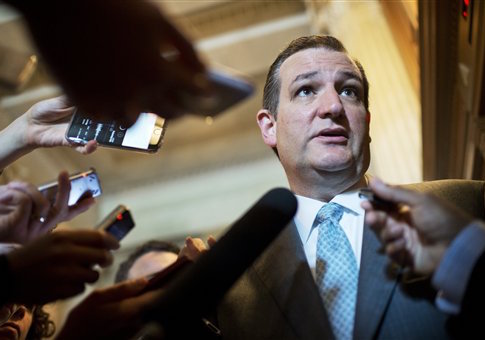Sen. Ted Cruz (R., Texas) is moving to block future State Department funding and nominees unless President Barack Obama guarantees that Congress will have the authority to fully review a recently inked nuclear accord with Iran before the deal is approved by the United Nations, according to a copy of a letter obtained by the Washington Free Beacon.
Cruz, a vocal opponent of the administration’s diplomacy with Iran, maintains that the White House is seeking to circumvent congressional review of the deal by going straight to the U.N.
Such a move could lift key sanctions on Iran before Congress has had the chance to fully review and vote on the deal.
Cruz says the United States should not be backing any U.N. action until Congress fulfills its legal role in reviewing—and potentially rejecting—the deal, which will provide Iran with billions of dollars in economic relief.
Under the parameters of the deal, the United States and other global powers have agreed to rollback U.N. restrictions on Iran’s importation of weapons and previous obligations to fully halt uranium enrichment work, heavy water work relevant to the development of a plutonium-based weapon, and the construction of ballistic missiles.
Cruz says none of these restrictions should be lifted before Congress has fully reviewed and voted on the deal. Legislators have legally been given 60 days to do this.
However, the nuclear deal inked in Vienna this week makes no mention of the law giving Congress the power to review the deal. Instead, it assumes that Congress has already signed off.
Cruz is threatening to block new funding for the State Department and withhold all of its nominees from approval until Obama guarantees that no U.N. action will be taken before Congress performs its oversight role.
"I write to express deep concern about your nuclear deal with Iran," Cruz wrote to Obama on Thursday, according to a copy of the letter.
"Language in the Joint Comprehensive Plan of Action (JCPOA) assumes Congressional consent of this agreement and fails to even mention the statutory review process that you signed into law on February 27, 2015," Cruz writes.
A key annex of the deal says the United States and Iran "‘will endorse this JCPOA,’ and further elucidates that the UN Security Council will undertake a prompt review of the agreement after the conclusion of negotiations," Cruz writes.
Within 90 days after the U.N. Security Council (UNSC) endorses the deal, the U.S. has promised to "issue waivers" aimed at rolling back sanctions on Tehran.
"Nowhere does the Annex mention the United States Congress or recognize mandatory Congressional review under the Iran Nuclear Agreement Review Act of 2015," Cruz writes. "By virtue of the Congressional review mechanism you agreed to, implementation of a deal cannot go into effect until Congress receives all necessary documentation, evaluates the deal, and renders a judgment."
As written, however, the deal does not acknowledge Congress’ role.
"It seems your Administration intended all along to circumvent this domestic review by moving the agreement to the UN Security Council before the mandatory 60-day review period ends, thus adopting an agreement without Congressional consent," Cruz writes. "That Samantha Power has already introduced a draft resolution to the Security Council portrays an offensive level of disrespect for the American people and their elected representatives in Congress."
Cruz demands that the White House act quickly to validate Congress’ role in approving or rejecting the deal.
"Under no circumstances should the Executive Branch take such action before the Congressional review process is complete," he writes. "Thus, I ask that you provide written assurances that you will take all necessary steps to block any UN Security Council resolution approving the JCPOA until the statutory timeline for Congressional review has run its course."
"Until you provide such assurances, I intend to block all nominees for the Department of State and hold any legislation that reauthorizes funds for the Department of State," Cruz writes.
Sen. Mark Kirk (R., Ill.) also has expressed concerns about the administration’s attempt to circumvent Congress.
"The White House’s plan to preempt Congress’s 60-day review of the Iran deal by first seeking approval from the U.N. Security Council, whose members include at least six non-democracies, would be a breathtaking assault on American sovereignty and congressional prerogative," Kirk said in a statement. "I am shocked that Secretary of State Kerry actually admitted, on the record, that he wants to create a situation where congressional disapproval of the Iran deal would make the United States in violation of the international community."
One D.C. political operative involved in the congressional fight expressed shock at the White House’s move.
"This is a move that the craziest militias in the 1990s could never have imagined," the source told the Free Beacon. "The president is de facto collaborating with an avowed enemy of the United States to leverage the undemocratic cesspool that is the United Nations against America’s lawmakers and the people who elected them."
